JIM JACKSON ( II )
Jim Jackson and King Vidor on the Set of the Film Hallelujah.png
Jim Jackson era un guitarrista amb un ampli repertori de folk i blues estaba considerat com un joglar similar Henry Thomas . Enormement popular per un curt temps gràcies als esforços competitius d'agents que treballen per a les companyies discogràfiques Vocalion Victor, Jackson es va convertir en famós a nivell regional a Memphis i Chicago durant els anys 20, després va tornar a casa durant la Gran Depressió i va morir el 1937. La seva casa era la ciutat d'Hernando al nord-oest de Mississippi (vint milles al sud de Memphis), on Jackson va néixer en una granja allá per 1884. Hernando també va esser el lloc de neixement del bluesman Robert Wilkins , més conegut per tenir diferents covers que The Els Rolling Stones van versionar de les seves cançons . Va ser Stokes que va tenir la major influència sobre el jove Jim Jackson , qui li va ensenyar inicialment com tocar la guitarra , el cant, i el ball, i rasgant les cordes per atreure multituds de venedors ambulants en els famosos aleshores Medicine Shows on es feia tota propaganda de la medicina , aixó era cap allá el 1905. Aviat el jove Jackson va participar en les reunions socials en tota la zona, de vegades donant concerts amb Wilkins i un banjo de Xarxa Banks, MS nomenat Gus Cannon . En 1915, Jackson va estar donan voltes per les carereteres temps i temps , amb espectacles de joglars. ...
Jim Jackson (June 1876 – December 18, 1933) was an African-American blues and hokum singer, songster, and guitarist, whose recordings in the late 1920s were popular and influential on later musicians.
Jackson was born in Hernando, Mississippi, United States. Researchers Bob Eagle and Eric LeBlanc date his birth as 1876, but other sources give 1884 or 1890. He was raised on a farm, where he learned to play guitar. Around 1905 he started working as a singer, dancer, and musician in medicine shows, playing dances and parties often with other local musicians such as Gus Cannon, Frank Stokes and Robert Wilkins. He soon began travelling with the Rabbit Foot Minstrels, featuring Ma Rainey and Bessie Smith, and other minstrel shows.
He also played clubs on Beale Street in Memphis, Tennessee. His popularity and proficiency secured him a residency at Memphis's prestigious Peabody Hotel in 1919. Like Lead Belly, Jackson knew hundreds of songs including blues, ballads, vaudeville numbers, and traditional tunes, and became a popular attraction.
In 1927, talent scout H. C. Speir signed him to a recording contract with Vocalion Records. On October 10, 1927, he recorded "Jim Jackson's Kansas City Blues", which became a best-seller, and in the melody and lyrics of which can be traced the outline of many later blues and rock and roll songs, including "Rock Around The Clock" and "Kansas City". Following his hit Jackson recorded a series of 'Kansas City' follow-ups and soundalikes. It also led to other artists covering (including William Harris in 1928) and reworking the song, including Charlie Patton, who changed it to "Gonna Move To Alabama". Jackson moved to Memphis in 1928, and made a series of further recordings, including the comic medicine show song "I Heard the Voice of a Pork Chop". He also appeared in King Vidor's all-black 1929 film Hallelujah!, however it is unclear what role he played.
Jackson ran the Red Rose Minstrels, a travelling medicine show which toured Mississippi, Arkansas and Alabama. As a talent scout for Brunswick Records, he discovered Rufus "Speckled Red" Perryman, gaining him his first recording session. Shortly afterwards, in February 1930, Jackson recorded his own last session. He later moved back to Hernando, and continued to perform until his death in 1933.
Legacy
Janis Joplin later recorded a version of "Kansas City Blues", inserting the lines "Babe, I'm leavin', yeah I'm a-leavin' this mornin' / Goin' to Kansas City to bring Jim Jackson home".
Jackson was a major influence on the Chicago bluesman J. B. Lenoir, and his "Kansas City Blues" was a regular fixture of Robert Nighthawk's concert set list. Brownie McGhee said Kansas City Blues was "the first tune that I ever learned to play." (Seattle Folklore Society video).
The song "Wild About My Lovin'" was covered by The Lovin' Spoonful and released on their 1965 debut album, Do You Believe In Magic.



Comments